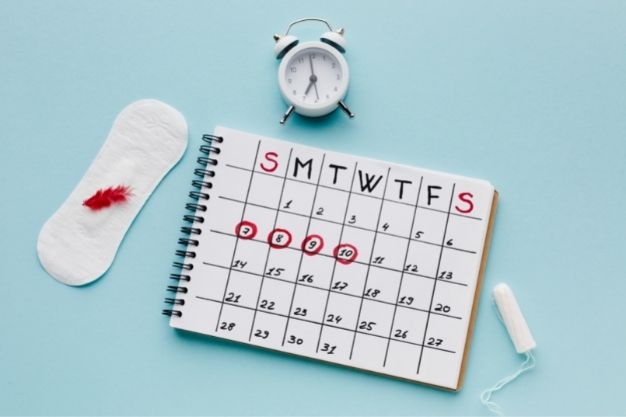Many factors influence the duration of the menstrual cycle. Consult your homeopath If your periods suddenly become substantially shorter or longer. Your periods suddenly become shorter. Hormone imbalances, fibroids, and polyps are examples of these. Check out the space below to know more about the sudden change in menstrual cycle length.
What you should know first:
- The number of days between periods is the length of your cycle, measured from the first day of your period to the day before your next period begins
- A typical cycle length for adults who do not use hormonal contraception is between 24 and 38 days
- Hormonal birth control may alter the duration and variability of your menstrual period
What exactly is the menstrual cycle, and how does it function?
The periodic cycle of changes that a woman’s body goes through in preparation for the potential of pregnancy is known as the menstrual cycle. Hormonal changes support the uterus for pregnancy parallelly. If ovulation occurs & the egg is not fertilized, the uterine lining sheds through the vaginal opening. This is the start of a menstrual cycle.
What is a “Normal” Menstrual Cycle?
Every woman’s menstrual cycle, which runs from the first day of one period to the next, is different. Menstrual flow can last anywhere from two to seven days and occur every twenty-one to thirty-five days. In the first few years after menstruation begins, long cycles are common. On the other hand, menstrual cycles tend to shorten and become more regular as you get older.
It doesn’t matter if your period is light or heavy, unpleasant or not, long or short; it’s still considered normal. Your period might be light or heavy, painful or pain-free, long or short, and your menstrual cycle can be regular — approximately the same duration every month — or somewhat irregular within a broad range, “normal” refers to what is normal for you.
Keep in mind that certain methods of contraception, such as extended-cycle birth control tablets and intrauterine devices (IUDs), can cause sudden changes in menstrual cycle length. To learn more about what to expect, speak with your health care practitioner.
As you approach menopause, your menstruation may become irregular once more. However, because the risk of uterine cancer rises with age, talk to your doctor about any unusual bleeding during menopause.
Why do cycles differ?
From time to time, you may notice changes. Your cycle duration is determined by your hormones, which might change as a result of things like food, stress, jet lag, working night shifts, exercising, or taking an emergency contraception tablet (the morning-after pill)

How Do I Know When I’ll Get My Period If It’s Irregular?
If your cycle is irregular, pay attention to your body’s signs. These may include the following:
- Back stiffness or cramps
- Breast pain or thicker breasts
- Headaches
- Acne outbreaks
- Sleep patterns are disrupted
- Fluctuations in mood
- Bloating
- Fluffy stools
What causes irregular menstrual cycles?
Several reasons can cause a sudden change in menstrual cycle length, including:
- Breastfeeding or pregnancy: A missed period might indicate an impending pregnancy. Breast-feeding seems to postpone the onset of menstruation after pregnancy
- Eating disorders: Significant weight loss or excessive exercise are disorders. Eating disorders, including anorexia nervosa, severe weight loss, and increased physical activity, can disrupt menstruation.
- Polycystic ovarian syndrome (PCOS): During an ultrasound test, women with this common endocrine system problem may have irregular periods and enlarged ovaries with little collections of fluid called follicles present in each ovary
- Ovarian failure occurs too soon: The lack of normal ovarian function before 40 is referred to as premature ovarian failure. Premature ovarian failure, also known as primary ovarian insufficiency, can cause women to have irregular or infrequent periods for years.
- Inflammation of the pelvis (PID): Menstrual irregularities can be caused by this infection of the reproductive organs.
- Fibroids in the uterus: Uterine fibroids are noncancerous uterine growths. They can produce heavy menstrual cycles and periods that can last a long time.
Your period is an excellent sign of what’s going on in your body and how well you’re generally doing.
Although your menstrual cycle may fluctuate over time, you should contact your doctor if you have any of the following potentially dangerous symptoms:
- Abdominal discomfort/pelvic pain: Uterine fibroids or endometriosis can cause constant pain. An infection, a burst ovarian cyst, or an ectopic pregnancy can cause sharp pelvic pain.
- Bleeding between periods is common: Spotting may occur occasionally, but tell your doctor if it occurs frequently, lasts for days, or is heavy and uncomfortable. It could indicate a vaginal injury, a miscarriage, or even cancer.
- Periods with a lot of activity/no activity: Any abnormal changes in your cycle, particularly heavy periods (requiring you to change your pad/tampon every hour) or bleeding that lasts longer than a week, should be reported to your doctor. Irregular or skipped periods are common, but they might sometimes signal a medical problem that needs to be treated.
- Bleeding after menopause: If you start bleeding after menopause, see your doctor right away because it could signify gynecologic cancer like cervical or endometrial cancer.
- Your menstrual cycle provides information about your general health: Pay attention to what you consider typical. Notify your doctor if you have any unexpected symptoms or notice any sudden change in menstrual cycle length

Should I Be Concerned About My Periods?
If you’ve had sex and haven’t had a period in a while, see your doctor since you could be pregnant. Also, inform the doctor if:
- You used to have regular periods; then, they became irregular
- You haven’t had a period in a long time
- Extra hair growth has appeared on your face, chin, chest, or abdomen
- You begin to have periods that last longer than seven days, are heavy, or occur more frequently than once every 21 days
- Your period occurs every 45 days or less
- You’re experiencing significant abdominal discomfort or cramps
- Between your cycles, you get bleeding
- For the past three years or more, your periods have been irregular
The doctor may give homeopathy treatment and suggest lifestyle modifications to help you have more regular periods.
Homeopathy Treatment:
Homeopathy is an effective medical approach for treating diseases since it stimulates healing and improves a person’s abilities. Most females have irregular periods due to junk food consumption or irregular food intake.
It is possible to do so by ingesting highly diluted treatments, which increase immunity and help fight symptoms that may develop into a sudden change in menstrual cycle length.
Natural components are used to make homeopathic medicines. The article delves into the details of homeopathy and assists you in locating the best Homeopath and other requirements, especially for the sudden change in menstrual cycle length.
Our team of well-experienced Homeopaths and active medications at Dr. Positive homeopathy has assisted many people in overcoming their irregular periods. When it’s about your precious health, never hesitate to contact us for the best homeopathy treatment.








